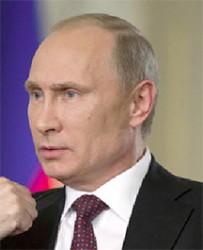MOSCOW, (Reuters) – An army assault on pro-Russian rebels in east Ukraine will not have taken Vladimir Putin by surprise, but the ferocity of the clashes may have – and could be a game-changer if they spin out of control.

In the last two weeks, with Western sanctions starting to bite, the Russian president has softened his tone against the pro-European leadership in Kiev and promised to pull troops back from the frontier with Ukraine.
The likelihood of Russian forces pouring into east Ukraine to capture mainly Russian-speaking areas has receded, and Putin appears to have settled for the gains he has made so far in the worst East-West standoff since the Cold War.
But Putin’s careful planning could quickly unravel under one circumstance – if a large number of civilians are killed in a single incident, putting public pressure on him to send in the army to protect Russian speakers.
The deaths of more than 50 pro-Russian separatists in a Ukrainian army assault may not be that moment, but it underlines the dangers inherent in Putin’s strategy.
“Sticking by the sidelines and doing nothing will risk a public backlash at home, of leaving ethnic Russians in Ukraine to the mercy of the administration in Kiev,” Ukraine analyst Tim Ash said. But, he said, “formal intervention by Russia will now risk new, more sanctions from the West on Russia.”
Putin seems, at least for now, to have rejected the option of sending in the army, but has opened a Pandora’s Box by whipping up nationalist sentiment over Ukraine.
“If bombing or shelling led to a new situation where many citizens were killed, his options could be a military strike from the air or an overland invasion,” Dmitry Trenin, head of the Carnegie Moscow Center think-tank, said before the assault.
“This is not Putin’s intention, but he could not sit astride the border and just watch the Ukrainian military crushing a town,” he said.
PROTECTING TOUGH- GUY REPUTATION
A former KGB spy with a tough-guy image, Putin would suffer a blow to his standing at home if he were seen as abandoning Russian speakers in Ukraine or did not meet force with force.
It seems inconceivable that he did not see the Ukrainian army’s assault coming once Sunday’s election was over.
“I don’t think it came as a surprise,” said political analyst Boris Makarenko. “It was clear the election campaign had served as a restraint on the army’s actions in Ukraine.”
What was less expected, and may have caught the Kremlin off guard, was the intensity of the clashes. Reuters correspondents saw dozens of corpses after a battle over Donetsk airport in east Ukraine, in which Kiev sent in jets and helicopters.
To a limited extent, the crushing of the rebellion in east Ukraine would play into Putin’s hands.
He seems to have settled for the annexation of Crimea, instability in Ukraine to undermine its rulers and a boost in popularity at home as ample reward from the crisis. Ukraine has also backed off trying to join NATO, a red line for Putin.
The rebels have become a threat to the status quo, and a potential irritant for Putin, because their unpredictable actions increase the risk of events getting out of control.
They also ignored a call he made to postpone a referendum on self-rule this month, though it is not clear whether he really meant them to act on his words or simply intended his comments to make the West think he was making a compromise.
NEW STANDOFF LOOMS
Putin has yet to comment in public on the election outcome or say how he will react to the surge in violence, but he was quoted by the Kremlin as telling Italy’s prime minister that Kiev’s military operation must end immediately.
That response was yet another shift in Putin’s tone after the relative softening of recent days, raising the prospect of a new standoff with Kiev even before billionaire businessman Petro Poroshenko is sworn in as president.
It is clear that Russia decided before the election that Poroshenko was the “least bad” candidate. Putin had unexpectedly described the ballot as likely to be a “step in the right direction” and signalled he would work with the next president.
But the Ukrainian government appears to have interpreted Poroshenko’s big election win as a mandate for decisive action, and it has toughened its stance in negotiations with Russia over its $3.5 billion debt for gas supplies.
Country risk analysts IHS said Poroshenko was “taking a hard line towards the separatist movements in the east in order to secure his public legitimacy and build on the firm majority he received in the 25 May elections”.
“Russia does not look like it is inclined to intervene at this point,” it added.
But NATO noted that despite signs that some Russian troops are withdrawing from Ukraine’s frontier, the bulk of the force remains close to the border.
As long as the troops are there, the threat of armed intervention by Russia will continue to hang over Ukraine, even if it is not Putin’s first choice of action.









